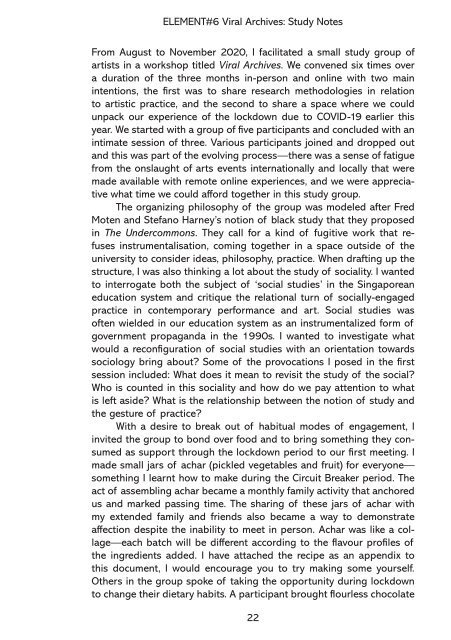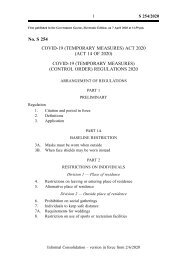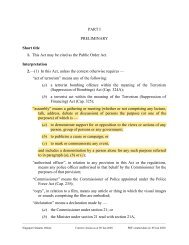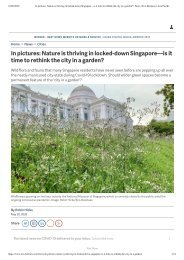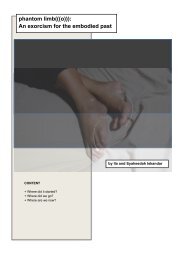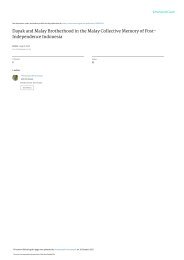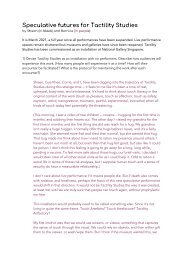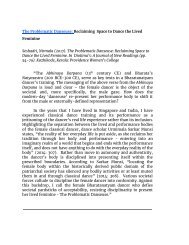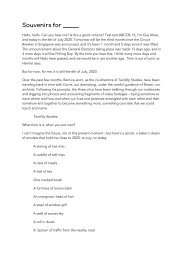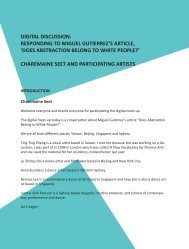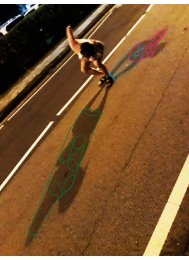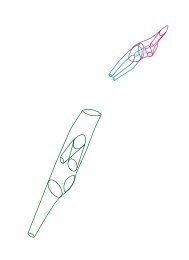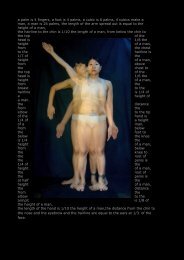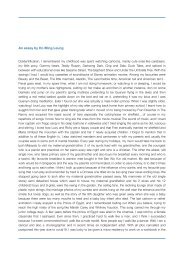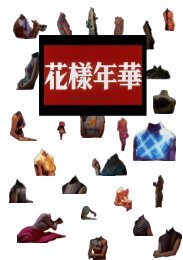FUSE#5
This edition of FUSE consists of articles contributed by artists who participated in Dance Nucleus' programmes in 2020.
This edition of FUSE consists of articles contributed by artists who participated in Dance Nucleus' programmes in 2020.
You also want an ePaper? Increase the reach of your titles
YUMPU automatically turns print PDFs into web optimized ePapers that Google loves.
FUSE #5<br />
cake that she learnt to make when switching to a keto diet. Another<br />
brought nougats with sesame seeds that she relied on as comfort food<br />
from an Indian mama shop.<br />
Ining, whose family runs a metal workshop in Sembawang,<br />
recounted how Circuit Breaker forced the migrant workers from<br />
Bangladesh and China to bond as they were not permitted to leave<br />
their dormitories and had to share cooking and grocery duties, and<br />
also acclimatise to each others’ dietary preferences. It started a general<br />
conversation about her metal workshop and fabrication which<br />
eventually led to us deciding to visit her studio as part of the final<br />
session in November.<br />
Over the subsequent months, the interest of the group shifted<br />
to research methodologies as we discussed strategies of approach<br />
practice-based research. I was working on an oral history project of<br />
cruising areas in Singapore and shared some difficulties I faced while<br />
conducting these interviews. The second half of the session evolved<br />
into looking at works that negotiate with documenting history, veracity<br />
of accounts, and the ethical positioning of the artist in relation to their<br />
subject. We visited NTU CCA’s penultimate exhibition and discussed<br />
Naeem Mohaiemen Two Meetings and a Funeral video work where<br />
he attempted to reconstruct a history of the Non-Aligned Movement<br />
(NAM) via interviews.<br />
We encountered a mix of theory, audio materials and other<br />
mixed-media as collective points of reference to anchor the conversation<br />
throughout the three months to talk about the promiscuity<br />
of the archive, exposure, and opacity. We read essays penned by<br />
Vijay Prasah regarding the Global Left and the Third World. We<br />
examined S. Rajaratnam’s appearance in the 1973 NAM meeting as<br />
a representative Singapore and the role he performed in shaping<br />
an imaginary Singapore as a global city. We listened to the New<br />
York Times podcast titled Caliphate about the American invasion<br />
of Mosul and reclaiming it from ISIS featuring journalist Rukmini<br />
Callimachi and the peripheral reports that accused her of relying<br />
on unverified sources and challenging the ethical limitations of her<br />
profession. We also took the opportunity to share works-in-progress<br />
to provide necessary critique for each other’s practice, we shared<br />
ways we manage information through online note-taking and time<br />
management apps like Notion.<br />
By way of concluding this short report, I return to a fragment<br />
from a speech in 1979 by S. Rajaratnam that we discovered in the<br />
archives. He titled this speech Old Maps in a New Age and it was made<br />
at the University of Malaya in 1979 on the subject of speaking truth<br />
to power.<br />
23


